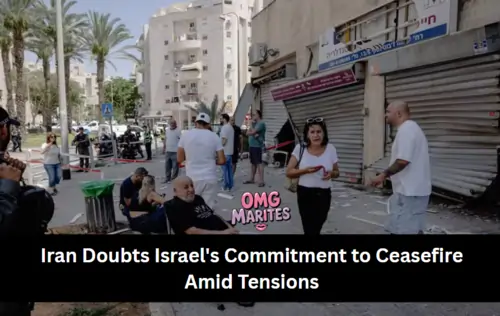Iran doubts Israel’s commitment to ceasefire after the fragile truce that ended the most intense and destructive conflict between the two nations.
The 12-day war began on June 13 when Israel launched a bombing campaign in Iran, targeting top military commanders and scientists linked to its nuclear program. In retaliation, Tehran fired ballistic missiles at Israeli cities.

Iran’s Response to Israel’s Aggression
Iran claims its primary goal was not to develop an atomic weapon, a charge Israel has consistently opposed. The fighting disrupted nuclear talks between Iran and the United States, which later joined Israel’s attacks on Tehran’s nuclear facilities.
Iranian Armed Forces Chief of Staff Abdolrahim Mousavi stated that Iran responded with full force to the Israeli aggression, while expressing serious doubts about Israel’s compliance with the ceasefire.
“We are ready to respond with force,” Mousavi added, emphasizing Iran’s readiness to act if provoked again. This came six days into the ceasefire, which Iran claims may not hold due to Israel‘s ongoing actions.
IAEA Dispute and Suspension of Cooperation
Iran has also rejected requests from the International Atomic Energy Agency (IAEA) to inspect its bombed nuclear sites, accusing IAEA Director Rafael Grossi of failing to condemn Israel and US attacks.
Iranian lawmakers recently voted to suspend cooperation with the IAEA, calling Grossi’s request “meaningless.” This has drawn criticism from Germany and Argentina, who condemned the threats against Grossi.
The Impact on Iran’s Nuclear Program
Meanwhile, US officials continue to monitor Iran’s nuclear program, with IAEA’s Grossi suggesting that Iran could resume uranium enrichment within months. Despite conflicting reports from the US, Israel has claimed that Iran’s nuclear program has been delayed by years due to the attacks, while Tehran downplays the damage.
Humanitarian Toll and Civilian Impact
The conflict has also had a humanitarian toll, with Iran reporting over 627 civilian deaths and 4,900 injuries, while retaliatory missile attacks from Iran on Israel killed 28 people. Iran has also arrested dozens accused of spying for Israel during the war.
A Call for New Dialogue in the Middle East
As the war continues to affect both nations, international voices are calling for a new dialogue in the Middle East, hoping for a shift in the long-standing tensions.
US Ambassador Tom Barrack stated that the Iran-Israel war could provide an opportunity to create a “new road” for the region and open discussions for peace.
Conclusion
With Iran doubting Israel’s commitment to the ceasefire, the region remains on edge, and the future of peace talks seems uncertain. Iran has made it clear that it is prepared to defend itself, raising further concerns about the potential for continued conflict.
References:
- Philstar.com –Iran voices ‘serious doubts’ over Israel commitment to ceasefire
- Lemonde.fr – After 12-day war between Israel and Iran, many questions, few certainties
- US and Israeli Strikes – Impact on Iran’s nuclear facilities .

Maria Theresa Mondragon, better known online as Antie Marites, is a 33-year-old Filipina content creator who’s turning “chismis” into credible news and meaningful conversation.
With a knack for storytelling and a passion for public service updates, Antie Marites creates relatable, informative, and bite-sized news content for the digital Pinoy. Whether it’s trending headlines, government announcements, or everyday life in the Philippines, she breaks it down in a way that’s clear, fun, and easy to understand—no filter, no fake news.
She’s the tita who sips her kape while scrolling DBM updates and turns it into your next viral TikTok.She’s also your go-to source for “real talk sa real-time news.”
Follow her journey and daily chika on:
📲 Facebook: OMGMarites
📱 TikTok: @omgmarites2025
